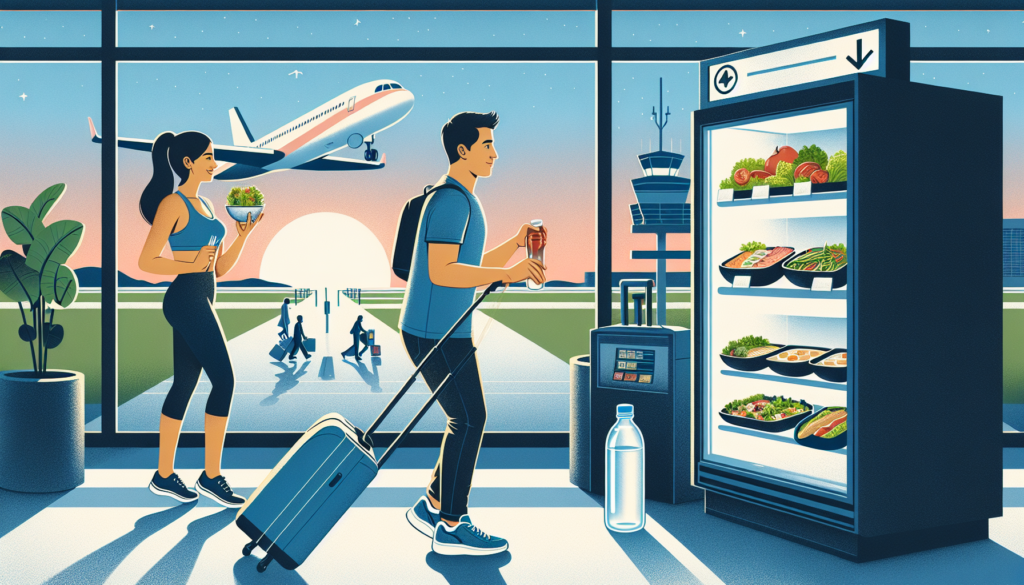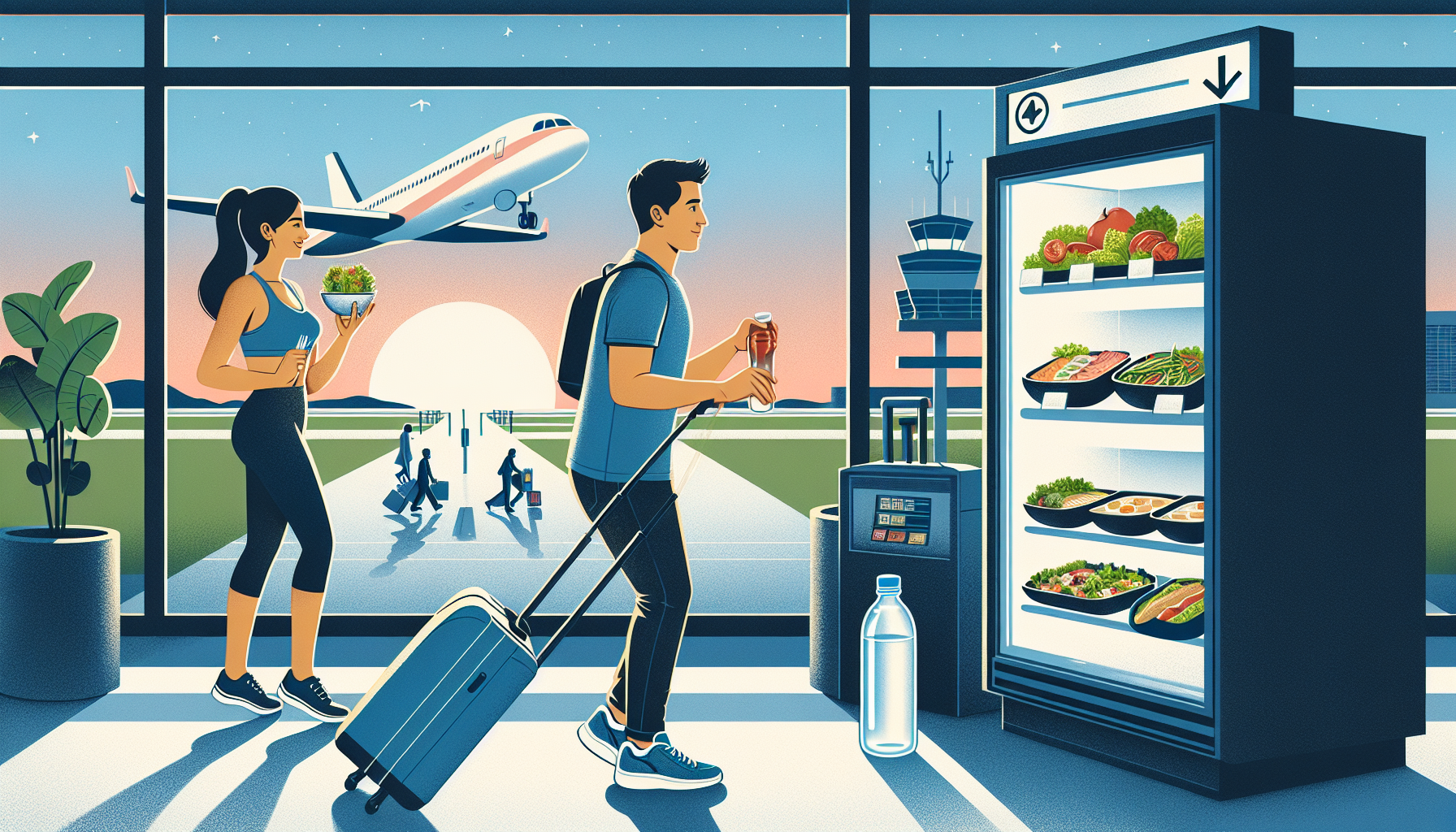Imagine embarking on your dream vacation, exploring exotic destinations, trying new foods, and experiencing different cultures. While traveling is undoubtedly an amazing experience, it can throw your healthy routine off track. But fear not, because in this article, you will discover practical tips on how to stay healthy and fit while exploring the world. From staying hydrated to incorporating physical activity into your itinerary, these simple yet effective strategies will ensure that you can fully enjoy your adventures while also taking care of your well-being. So pack your bags and get ready to stay fit, healthy, and energized throughout your travels!
Maintaining a Balanced Diet
Plan Ahead and Pack Healthy Snacks
When traveling, it’s easy to fall into the trap of grabbing convenient but unhealthy snacks. To maintain a balanced diet, it’s essential to plan ahead and pack healthy snacks. Before you embark on your trip, take some time to prepare nutritious snacks such as trail mix, fruits, and vegetable sticks. These snacks will not only keep you satiated during long journeys but also provide you with the necessary nutrients to stay energized.
Choose Healthy Options When Dining Out
Eating out is one of the highlights of travel, but it can also lead to unhealthy choices. When dining out, opt for healthier options on the menu. Look for dishes that include lean proteins, whole grains, and plenty of vegetables. Also, pay attention to portion sizes and avoid overeating. You can ask for dressings and sauces on the side to control the amount you consume. Remember, making healthier choices will contribute to maintaining a balanced diet and feeling your best while on the go.
Stay Hydrated Throughout Your Travel
Staying hydrated is crucial for overall well-being, especially when traveling. Dehydration can lead to fatigue, headaches, and lack of focus – all of which can make your travel experience less enjoyable. Make sure to drink plenty of water throughout the day, even when you’re not feeling thirsty. Carry a reusable water bottle and refill it whenever you come across a water source. Additionally, limit your intake of sugary beverages and alcohol, as they can dehydrate your body.
Managing Sleep and Rest
Stick to Your Regular Sleep Schedule
Maintaining a regular sleep schedule while traveling can be challenging, especially when jumping through different time zones. However, it’s crucial to stick to a consistent sleep routine as much as possible. Try to go to bed and wake up at the same time you would at home to regulate your body’s internal clock. This will help ensure you get enough rest and minimize the effects of jet lag.
Create a Comfortable Sleep Environment
Creating a comfortable sleep environment is essential for quality rest while traveling. Bring earplugs and an eye mask to block out any disturbances. If your accommodation allows, try to choose a quiet room away from noisy areas. Additionally, ensure you have a comfortable pillow and bedding to promote a good night’s sleep. Taking these steps will help you feel well-rested and ready to take on each day of your trip.
Practice Relaxation Techniques
Traveling can be exciting, but it can also bring about stress and anxiety. Taking the time to practice relaxation techniques can help you manage these emotions and maintain a sense of calm. Deep breathing exercises, meditation, and yoga are effective ways to relax your mind and body. Consider finding a peaceful spot wherever you are and spend a few minutes each day engaging in these practices. Not only will it help you de-stress, but it will also contribute to better sleep and overall well-being.
Take Power Naps When Necessary
If you find yourself feeling tired during the day, don’t hesitate to take power naps. Power naps can provide a quick energy boost and help you feel refreshed. Keep your naps short (around 15-20 minutes) to avoid disrupting your regular sleep pattern. Find a quiet and comfortable place to rest, and set an alarm to ensure you don’t oversleep. Taking power naps strategically can help you optimize your energy levels and make the most of your travel experience.

Incorporating Exercise into Your Travel
Plan Active Sightseeing Activities
Travel provides abundant opportunities to incorporate exercise into your itinerary. When planning your sightseeing activities, opt for those that involve physical movement. Explore cities on foot or rent a bike to tour around scenic areas. Hiking, swimming, and kayaking are also great ways to stay active while enjoying the natural beauty of your destination. By prioritizing active activities, you can combine sightseeing and exercise, keeping your body active and fit.
Use Hotel Facilities for Workouts
Many hotels offer fitness facilities, including gyms or swimming pools. Take advantage of these amenities to squeeze in some exercise during your trip. You can hit the gym for a quick workout session or do laps in the pool. If you’re not sure how to use the equipment, don’t hesitate to ask for assistance from the hotel staff. Utilizing these facilities will not only help you stay fit but also break up the monotony of travel and provide a refreshing break.
Explore Outdoor Activities
Exploring outdoor activities unique to your destination can be an exciting way to stay active while traveling. Consider activities such as surfing, skiing, or rock climbing, depending on the location and season. These outdoor activities not only allow you to experience the thrill of adventure but also provide an excellent full-body workout. Research and plan ahead to find out what outdoor activities are available at your destination, and be ready to embrace the opportunity for a healthy and exciting adventure.
Try Out Local Fitness Classes
Immerse yourself in the local culture and stay active by trying out fitness classes popular in the area you’re visiting. Many cities offer a variety of classes such as yoga, dance, or martial arts. Joining a local class not only keeps you fit but also allows you to meet new people and experience the unique exercise routines of different cultures. Check local listings or ask for recommendations from locals or your hotel concierge to find classes that suit your interests and fitness level.
Taking Care of Your Mental Health
Manage Travel Stress
Traveling, especially to unfamiliar places, can sometimes be stressful. To take care of your mental health, it’s essential to manage travel stress effectively. Take breaks when needed, allowing yourself time to rest and recharge. Don’t try to pack your itinerary with too many activities, as over-scheduling can add unnecessary pressure. Be mindful of your energy levels and listen to your body’s signals. Remember, travel is meant to be enjoyable, so prioritize relaxation and stress management to make the most of your experience.
Practice Mindfulness and Meditation
Mindfulness and meditation can be powerful tools for maintaining mental well-being while traveling. Take a few moments each day to practice mindfulness by focusing on your breath and being fully present in the current moment. Meditation can also help you find calm and clarity amidst the excitement and chaos of travel. Various mindfulness apps are available that offer guided meditation exercises, making it easy to incorporate these practices into your daily routine. By cultivating mindfulness, you can enhance your travel experience and find greater peace and happiness.
Connect with Friends and Family
One of the challenges of travel is being away from loved ones. However, staying connected with friends and family is vital for your mental health and well-being. Make time to connect through phone calls, video chats, or even sending postcards. Sharing your travel experiences and hearing familiar voices can bring comfort and a sense of belonging. Additionally, try to make new connections with locals or fellow travelers, as social interactions can also contribute to a positive mindset and overall happiness.
Engage in Activities that Bring You Joy
Traveling provides an excellent opportunity to engage in activities that truly bring you joy. Whether it’s exploring art galleries, dancing to live music, or visiting local markets, make time for activities that make you happy. When you engage in activities that bring you joy, your mental health will naturally flourish, adding an extra layer of fulfillment to your travel experience. Listen to your inner desires, discover new interests, and allow yourself to fully enjoy your journey.

Preventing Illness
Keep Your Hands Clean
Maintaining good hand hygiene is one of the most effective ways to prevent illness while traveling. Wash your hands frequently with soap and water for at least 20 seconds, especially before eating and after using public facilities. If soap and water are not readily available, use a hand sanitizer with at least 60% alcohol content. Additionally, avoid touching your face, nose, and mouth with unwashed hands to minimize the risk of contracting germs.
Get Vaccinated Before Traveling
Before embarking on your trip, ensure that you are up to date with your vaccinations. Visit a travel clinic or consult your healthcare provider to find out which vaccinations are recommended for your specific destination. Vaccinations are crucial in protecting yourself against various diseases and preventing the spread of illnesses to others. By being proactive and getting vaccinated, you can minimize the risk of falling ill while traveling.
Protect Yourself from Insect Bites
Insect bites can lead to a variety of illnesses, such as malaria, dengue fever, or Zika virus infection. To protect yourself, use insect repellent containing DEET or other approved ingredients. Wear long-sleeved shirts, long pants, and closed-toe shoes when in areas with a high risk of insect-borne diseases. Consider staying in accommodations with properly screened windows or using bed nets treated with insecticide. Taking these precautions will help keep mosquitoes and other biting insects at bay, reducing the chance of contracting any diseases they may carry.
Be Cautious with Consuming Local Food and Water
Trying local cuisine is undoubtedly one of the highlights of travel, but it’s essential to be cautious when consuming food and water in unfamiliar places. Avoid drinking tap water unless it has been properly treated or boiled. Stick to bottled water or other safe alternatives. When eating street food, choose vendors with good hygiene practices and high turnover of food. Opt for thoroughly cooked meals and avoid raw or undercooked foods, as they may carry harmful bacteria. By being mindful of what you consume, you can minimize the risk of foodborne illnesses and ensure your health remains intact throughout your trip.
Maintain a Strong Immune System
A robust immune system is your body’s first line of defense against illness. While traveling, it’s crucial to support your immune system to stay healthy. Make sure you eat a well-balanced diet rich in fruits, vegetables, whole grains, and lean proteins. Stay physically active and engage in regular exercise to boost your immune system. Additionally, get plenty of rest and manage stress levels to support your body’s natural defenses. By prioritizing your immune health, you can minimize the chances of falling ill and enjoy your travel journeys to the fullest.
Maintaining Personal Hygiene
Stick to Your Regular Hygiene Routine
Traveling should not disrupt your regular hygiene routine. Continue to brush your teeth at least twice a day and floss regularly. Shower or bathe daily to keep your skin clean and moisturized. Additionally, wash your hair as needed to maintain a fresh and healthy scalp. By sticking to your regular hygiene practices, you’ll feel refreshed and confident throughout your travels.
Use Hand Sanitizer
Hand sanitizer is a convenient and effective way to keep your hands clean, especially when soap and water are not available. Carry a travel-sized hand sanitizer and use it before meals, after using public facilities, or when in crowded places. Look for a hand sanitizer that contains at least 60% alcohol for optimal germ-killing efficacy. Using hand sanitizer regularly will help prevent the spread of germs and keep you protected during your travel adventures.
Carry Travel-sized Toiletries
When traveling, space in your luggage is often limited. Invest in travel-sized toiletries to save space and ensure you have all your essentials. This includes mini shampoo and conditioner, toothpaste, and body wash. Having travel-sized toiletries readily available allows you to maintain your personal hygiene while on the go. Additionally, consider packing wet wipes for quick refreshes throughout the day.
Take Care of Your Oral Health
Your oral health is important, even when you’re traveling. Pack a travel-sized toothbrush and toothpaste to maintain good oral hygiene. Make it a habit to brush your teeth after meals or at least twice a day. If you’re traveling to an area with limited access to clean water, consider using bottled water for tooth brushing. Don’t forget to floss daily to remove plaque and prevent gum disease. By taking care of your oral health, you’ll keep your smile bright and maintain optimal overall health.
Protect Your Skin and Apply Sunscreen
Protecting your skin from the sun’s harmful rays is essential for maintaining healthy skin and preventing sunburn. Apply sunscreen with a high SPF (preferably 30 or higher) before going outdoors, and reapply it every two hours, or more frequently if you’re sweating or swimming. Cover exposed skin with lightweight, breathable clothing to provide an additional layer of protection. Don’t forget to wear a hat and sunglasses to shield your face and eyes from the sun. By prioritizing sun protection, you can enjoy your time in the sun while keeping your skin safe and healthy.
Managing Jet Lag
Adjust Your Sleep Schedule Before Traveling
To minimize the effects of jet lag, try adjusting your sleep schedule a few days before your trip. Gradually shift your sleep and wake times closer to those of your destination. This will help your body adapt to the new time zone more smoothly. If you’re traveling eastward, try going to bed earlier each night. If you’re traveling westward, go to bed later. By gradually adjusting your sleep schedule, you can reduce the impact of jet lag and acclimatize to the new time zone more quickly.
Stay Hydrated and Avoid Caffeine and Alcohol
Maintaining hydration is crucial for combating the symptoms of jet lag. Drink plenty of water before, during, and after your flight to stay hydrated. Avoid excessive caffeine and alcohol consumption, as they can contribute to dehydration and disrupt your sleep patterns. Stick to water, herbal tea, or natural fruit juices to keep your body hydrated and aid in adjusting to the new time zone.
Get Exposure to Natural Light
Natural light plays a significant role in regulating your body’s internal clock. When you arrive at your destination, make a conscious effort to get exposure to natural light during the day. Spend time outdoors or sit by a window to let sunlight into your surroundings. This exposure to natural light will help reset your body’s circadian rhythm and assist in adjusting to the local time. Getting outside and soaking up the sun can also boost your mood and energy levels.
Gradually Adapt to the New Time Zone
Once you arrive at your destination, gradually adapt to the new time zone. Try to match your activities, such as meals or sleep, to the local time as soon as possible. Avoid taking long naps during the day, as they can disrupt your sleep at night. Instead, push through until your regular bedtime and wake up time to reset your internal clock. By gradually adjusting to the new time zone, you can overcome jet lag more effectively and enjoy your travel experience to the fullest.
Finding Balance in Your Travel Routine
Set Realistic Expectations
When traveling, it’s essential to set realistic expectations for yourself. Understand that you may not be able to do everything on your wishlist, and that’s okay. Pace yourself and prioritize the activities and attractions that mean the most to you. By setting realistic expectations, you can avoid feeling overwhelmed and enjoy your travel experience at a comfortable and sustainable pace.
Allow for Flexibility in Your Plans
While having a well-planned itinerary can be beneficial, it’s equally important to allow for flexibility in your plans. Unexpected events, weather conditions, or changes in local circumstances can alter your original schedule. Embrace these changes and be open to embracing new opportunities that come your way. By being flexible, you’ll be able to adapt to unforeseen circumstances and make the most out of any situation.
Prioritize Self-care
Traveling can be physically and mentally demanding, so it’s crucial to prioritize self-care. Take time for yourself each day to relax, unwind, and recharge. This might involve taking a long bath, reading a book, or simply sitting in a park and people-watching. Listen to your body’s needs and honor them. By prioritizing self-care, you’ll maintain a healthy balance between exploration and relaxation throughout your journey.
Avoid Overindulging
While it’s tempting to indulge in local cuisine and treats, it’s important to avoid overindulging. Eating excessive amounts of rich and fatty foods can leave you feeling sluggish and weigh you down. Practice moderation and portion control when indulging in local delicacies. Remember, you can still enjoy the flavors of your destination without overdoing it. By being mindful of what and how much you consume, you can maintain a balanced diet and feel your best while on your travel adventures.
Find Ways to Relax and Unwind
Finding moments to relax and unwind is crucial for maintaining balance during your travels. Engage in activities that help you disconnect from the stress and busyness of the day. This might involve taking a leisurely stroll through a park, sitting by the beach, or having a picnic in a picturesque spot. Allocate time each day to do something that helps you find peace and tranquility. By incorporating relaxation into your travel routine, you’ll feel rejuvenated and ready to take on new adventures.
Tips for Air Travel
Move Around the Cabin
Sitting for long periods during air travel can lead to stiffness and discomfort. To stay healthy and comfortable, make an effort to move around the cabin whenever possible. Walk up and down the aisles, stretch your legs, and do some simple exercises to keep your blood flowing. Take advantage of any opportunity to get up and move during extended flights. Moving around the cabin will also help prevent blood clots and reduce the risk of deep vein thrombosis.
Stay Hydrated
The cabin air in airplanes is notoriously dry, which can lead to dehydration during air travel. Drink plenty of water throughout your flight to combat this. Although the airline may provide beverages, it’s a good idea to bring your own refillable water bottle to ensure you have access to water whenever you need it. Carry a small hydration pack or drink herbal teas to stay hydrated and maintain your overall well-being.
Wear Comfortable Clothing
Choosing comfortable clothing for air travel is key to maintaining your comfort and well-being throughout your journey. Opt for loose-fitting, breathable fabrics that allow for easy movement. Avoid tight or restrictive clothing that can constrict blood flow and cause discomfort. Additionally, layer your clothing to accommodate changes in temperature on the plane. By wearing comfortable clothing, you’ll feel more relaxed and ready to enjoy your travel experience.
Avoid Overeating
Airplane meals are often packed with sodium and can leave you feeling bloated and uncomfortable. Avoid overeating during your flight to prevent discomfort and promote healthy digestion. If possible, choose healthier meal options or pack your own nutritious snacks to enjoy on the plane. Eating smaller, lighter meals will help your body adjust to the restricted movement and reduce the risk of digestive issues during or after your flight.
Bring Healthy Snacks
Bringing healthy snacks on your flight ensures that you have nutritious options readily available. Pack snacks such as nuts, dried fruit, or granola bars to keep your energy levels high and hunger at bay. While airline meals may be provided, having healthy snacks on hand can be a lifesaver if you have dietary restrictions or if the meal options don’t align with your desired nutrition choices. By bringing your own healthy snacks, you’ll have peace of mind and sustenance throughout your journey.
Conclusion
Staying healthy and fit while traveling is essential for enjoying your journey to the fullest. By following these tips, you can maintain a balanced diet, manage sleep and rest, incorporate exercise, take care of your mental health, prevent illness, practice personal hygiene, manage jet lag, find balance in your travel routine, and make the most of your air travel experience. Remember, your well-being is paramount, so prioritize self-care and listen to your body’s needs throughout your travel adventures. With these practices in place, you’ll be able to travel with ease, feeling energized, and ready to create lifelong memories.

